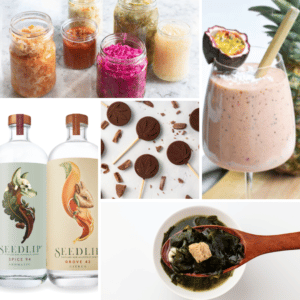An overview of health trends at the table

Chef, yes Cheffe! Food wellness is coming to the table. Adwise's strategic planning takes you to a new food planet. We take a look at the trends in health at the table.
Food in transition
- 71% of consumers have made a change in their diet in the last two years
- The vast majority of them have done so to move towards a healthier diet (67%) and by paying attention to ingredients (37%).
Fermented products
- We are witnessing the great return of fermentation.
- More than one consumer out of 10 declares consuming fermented products to improve their health.
- The virtues and benefits of these foods are numerous: rich in vitamins and probiotics, they contribute to the proper functioning of the digestive system and the strengthening of the immune system.
Superfoods
- Superfoods (fruit, seed, root, mushroom, algae....) are increasingly present for the body-mind balance and its richness in essential nutrients.
- The driver of this trend: The will to integrate medicinal virtues in one's diet to alleviate diseases, nutritional deficiencies and ageing.
The Immuno Food
- 2/3 of consumers have favoured "Immunity Boosting" products over the period 2020-2022
- X8 for new immunity boosting products one year after the beginning of the pandemic (mainly fermented dairy products or drinks combining probiotics and vitamins)
CBD
Ubiquitous in the distribution channels and ranked number 3, cannabidiol (CBD) is making its way into the food market with infusions, drinks and various products based more on a promise than on their organoleptic qualities. Numerous brands of CBD-based refreshments are emerging and the market for CBD drinks is booming.
Fad or sustainable trend?
With or without alcohol
- 0° - The non-alcoholic spirits segment continues to expand. The promise: to provide fun and pleasure without stigmatising teetotalers, whether for a day or forever.
- Hard-selzers: water, bubbles, alcohol. The promise: strong and controlled sensations with a range of low-alcohol flavoured sparkling drinks.
Vegetable-based cuisine
Plant-based cuisine consists of avoiding animal-based foods as much as possible, giving preference to fruits, vegetables, cereals and even edible flowers to reduce animal suffering. A healthy diet that preserves the body and nature.
- 45% of consumers have reduced or stopped their meat consumption in France.
- 41% of those surveyed feel guilty about their meat consumption because of animal suffering.
Meat substitutes
The growing popularity of meat substitutes is one of the most striking developments in the food industry. Driven by increasing consumer demand, new product launches and innovations are accelerating the growth of the international market.
Nestlé sells vegan meat products under the Gourmet Garden brand and has introduced plant-based burgers in the U.S. and Switzerland under the Sweet Earth brand.Unilever has acquired The Vegetarian Butcher, a Dutch plant-based meat manufacturer.
Combining health and wellness
It's all in the plate for you and your loved ones. Today, health is part of a holistic and preventive vision. How to achieve this? By opting for products and ingredients that are increasingly natural and recipes with increasingly simple processes.
Sources : SIAL Insights 22 and Social Listening.




